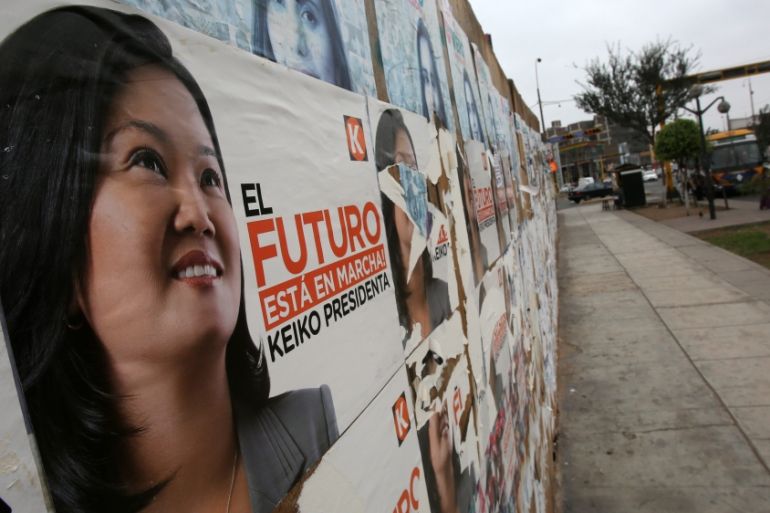Peru vote: Fujimori and Kuczynski ‘tied’ in exit polls
Peru’s presidential election too close to call, three exit polls show at the close of voting.

Voters in Peru have cast their ballots to elect a new president, with exit polls at the close of voting showing that candidates Keiko Fujimori and Pedro Pablo Kuczynski are heading for a photo finish.
Two polling agency projections gave former Wall Street banker Kuczynski a thin lead over Fujimori, the daughter of an imprisoned former president. A third exit poll, however, gave Fujimori a small victory.
Keep reading
list of 4 itemsJacob Zuma’s nine lives: How South Africa’s ex-president keeps coming back
A flash flood and a quiet sale highlight India’s Sikkim’s hydro problems
Ruling HDZ party wins most seats, but no majority in Croatia election
– The population of Peru is 31 million
– It is a big exporter of copper, gold and other minerals
– Inflation stood at 3.6 percent last year
– Peru’s GDP growth in 2015 was 2.7 percent
– The IMF forecasts it will grow by 3.7 percent in 2016
Sources: IMF, World Bank
Sunday’s election forced voters to confront the South American nation’s dark recent past.
Some Peruvians mistrust Fujimori because her father, Alberto, is in jail for corruption and the slaughter of alleged terrorists in the 1990s. Others hope she will, like him, take a tough line on security to fight a wave of violent crime.
Both she and Kuczynski have vowed to heal divisions dating back to the dark years of a 1980-2000 civil conflict involving leftists and the state.
“I want to be president of Peru to work for change … to build a great, prosperous country that is united and reconciled,” Fujimori told supporters at her closing campaign rally late on Thursday.
Kuczynski, a flute-playing economist, stressed his long experience as a banker and former minister.
“We will not have to read the instruction manual, because we know what must be done,” he told supporters.
READ MORE: Peru’s history of forced sterilisation overshadows vote
Both candidates are right-leaning, US-educated politicians. Fujimori is the granddaughter of Japanese immigrants. She wants to build more prisons and boost police numbers.
Kuczynski, a former World Bank economist, is the son of a German doctor who treated lepers in the Amazon jungle. He pledges to stamp out corruption and cut sales tax.
Al Jazeera’s Mariana Sanchez, reporting from the capital Lima, said Fujimori, the winner of the first round, “has had the lead” throughout the pre-election period.
“She has been campaigning for five years,” Sanchez said. “She went throughout the country, reaching the most remote places.”
But, polls on Saturday showed Fujimori had lost her earlier lead as the two candidates were locked in a technical tie. Pollster GfK gave Kuczynski 51.1 percent to 48.9 percent for Fujimori.
|
|
“One reason for this change is Kuczynski’s performance in last Sunday’s debate,” said Sanchez.
“He did much better than before.
“He portrayed himself as the man who could do the job, as the economist who can manage the economy.”
Also, Fujimori’s election campaign has been stained by allegations of corruption and irregularities.
Before the first round, opponents tried to her excluded for alleged vote-buying, but the electoral board dismissed the case against her, although expelling several other candidates.
A corruption scandal later struck the secretary-general of her party, Joaquin Ramirez. He resigned after media revealed that the US Drug Enforcement Agency was investigating him over suspected money-laundering.
Both run-off candidates are seen as pro-market in their plans to further Peru’s economic growth.
“Peru’s case is problematic ,” analyst Heber Campos told Al Jazeera.
“It has grown between 8 and 9 percent, has a huge surplus, and despite this there are communities that don’t have, for example, their sanitation needs resolved.
“It’s absurd. It proves the incompetence of our political class who are insensitive to these needs.”
Peru’s economy is outperforming most of its neighbours, but growth has declined during the term of outgoing President Ollanta Humala.
The International Monetary Fund forecasts it will grow by 3.7 percent this year.